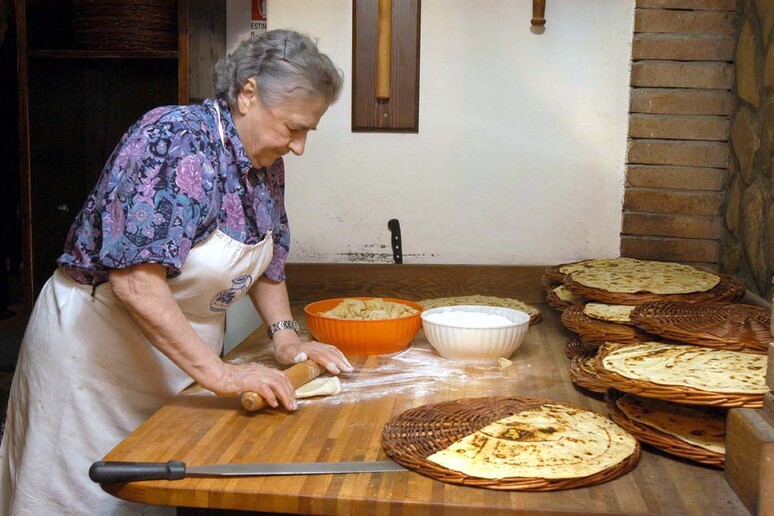The culinary pride of Romagna,
the time-honoured piadina flat-bread sandwich, has kept up
Italy's lead in Europe's quality-food stakes.
The piadina, which dates back to Roman times, has been
recognized by European officials for its unique origins and
importance as a traditional fast food, receiving formal
protection as a significant Italian product.
The European Protected Geographic Indication - IGP in
Italian or PGI in English - means the soft, rich flatbread that
is the perfect base for cheese, ham or other sandwiches will now
be protected from weak imitations and fakes.
"This is an important achievement," said Italian
Agricultural Minister Maurizio Martina.
"Our heritage is increasingly unchallenged on a European
and world stage," he added.
The IGP designation has become increasingly well known
internationally as representing quality food products with a
confirmed Italian pedigree.
The more stringent Protected Denomination of Origin - DOP
in Italian or PDO in English - is also known around the world as
a certification of the authentic origins and production methods,
specific to a region.
These protect some of Italy's most iconic products as olive
oil and the balsamic vinegar of the Emilia Romagna region.
Under EU law, products must abide by strict production
regulations and geographical restrictions to be graded as
genuine and worthy of an IGP or DOP seal.
The IGP certification traces food specialties back to their
geographical origin during at least one phase in production, but
not to all phases like the DOP seal.
Italian authorities are continually battling the sale of
the counterfeits of the nation's traditional food products.
The piadina's IGP designation was announced this week in
the official Journal of the European Union and will come into
force on November 24.
Italy is a leader in food designations, with more than
1,000 products on its registries.
Excluding wines, as of December 31, 2012, Italy boasted 248
products sporting the EU's coveted DOP, IGP, or Guaranteed
Traditional Specialty (STG) seals.
France came in a distant second at 192 such products,
followed by Spain with 161.
Italy had kept up its lead over the years with a fund of
scrumptious entries.
For example, three years ago, in 2011, a sheep's cheese
produced on the hillsides near Enna in Sicily earned an EU
quality-food laurel.
The Piacentinu Ennese, cultivated with centuries-old lore
and laced with a distinctive touch of saffron, won a Protected
Designation of Origin (PDO) appellation, the most prestigious of
the EU's three food quarantees that keep genuine articles safe
from inferior pretenders.
Italy's almost 250 quality foods generate a turnover of
some six billion euros a year, amid rising interest from new
consumers in China, India, Vietnam and Thailand.
Before the Enna cheese, the most recent Italian entry was
a type of chestnut native to the Val di Susa in Piedmont, the
'Marrone della Valle di Susa', which won a PGI label in
November.
The nut owes its creamy-white and crunchy flesh to the
special soil of the valley north of Turin, experts say, and has
been a staple of the local economy since the Middle Ages.
The nut followed into the rankings a type of wheat called
spelt ('farro') once used by the Romans and still cultivated in
the fields around Spoleto, which earned a PDO in July.
Before the farro, entries included a traditional pastry
from Siena and a potato grown around Bologna.
Siena's famed Ricciarelli biscuits, a slim lozenge-shaped
dainty that morphed from an original curly creation by a
Crusading knight impressed by an Arab sweetmeat, won a PGI
label. The 'Patata di Bologna' won a PDO.
FOOD SPURT.
Italy's special foods have put in a spurt in the last three
years.
A fragrant white celery from Sperlonga received a PGI label
aimed at keeping other celeries from posing as the aromatic
product from the marshlands near the ancient coastal village
between Rome and Naples which have for centuries produced the
unique vegetable.
The 'Mela di Valtellina' won a PGI label to guard the
strongly scented, firm-fleshed apple from the sub-Alpine
valley.
In January 2010 that Italian food glory, Neapolitan pizza,
got a long-awaited TSG label.
In December 2009 a 'prosciutto crudo' from Cuneo claimed a
PDO.
It was the third product to get a PDO in less than a week,
following a chestnut from the Tuscan village of Caprese
Michelangelo and the Piennolo tomato from the slopes of Mt
Vesuvius.
In October 2009, a traditional sour cherry jam produced
near Modena, 'Amarene Brusche di Modena' was awarded a PGI,
while 'Ciauscolo', a large soft spreadable sausage from the
Marche region, got the same recognition in August 2009.
Other recent additions have included Sicily's 'Pagnotta del
Dittaino' bread, with a PDO label; Roman suckling lamb,
abbacchio romano, which earned a PGI label; and Modena's
balsamic vinegar, another PGI.
Italian culinary glories like Parmigiano, buffalo
mozzarella, mortadella, lardo di Colonnata, Ascoli olives,
pesto sauce and Pachino plum tomatoes have been protected for
some time.
Lesser-known munchies like Mt Etna prickly pears and
Paestum artichokes swelled the ranks in 2009 along with two
kinds of saffron, from San Gimignano and L'Aquila.
A range of salamis, rices, honeys and nuts are also on
the protected list.
Several up-and-coming regional wines have earned TGIs.
PDO identifies a product whose characteristics are
exclusively dependant on a geographical origin and whose
productive phases all take place in the specified area.
PGI defines a product whose characteristics can be
connected with its geographical origin and that has at least
one productive phase located in the specified area.
TSG distinguishes a product whose raw materials,
composition or recipe, production method or transformation,
are of a traditional type.
ALL RIGHTS RESERVED © Copyright ANSA











